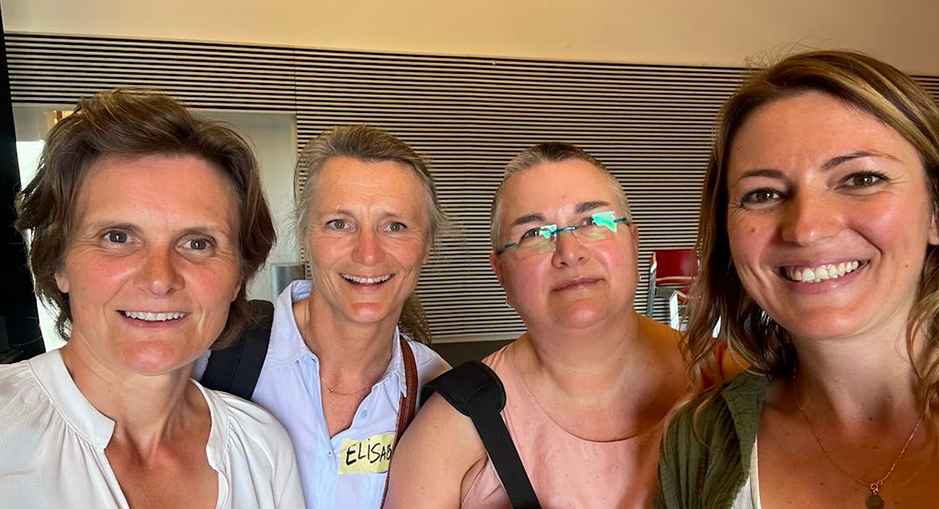Building Inclusive Communities: How a Paris Banlieue Could Redefine Social Impact through Systems Thinking
For the third consecutive year, students from HEC Paris joined forces with local residents, entrepreneurs, and municipal representatives from Les Mureaux to tackle some of society’s most pressing challenges. This Inclusion & Social Business course led by HEC’s Bénédicte Faivre-Tavignot, is a hands-on exercise in inclusive innovation, guided by the principles of systems thinking. Spearheading this initiative was Judit Osika, a consultant with a background in social technologies. Over the course of the day, she facilitated a “collective intelligence approach” aimed at generating sustainable, community-driven solutions for a suburb with a history of both troubles and marginalization.
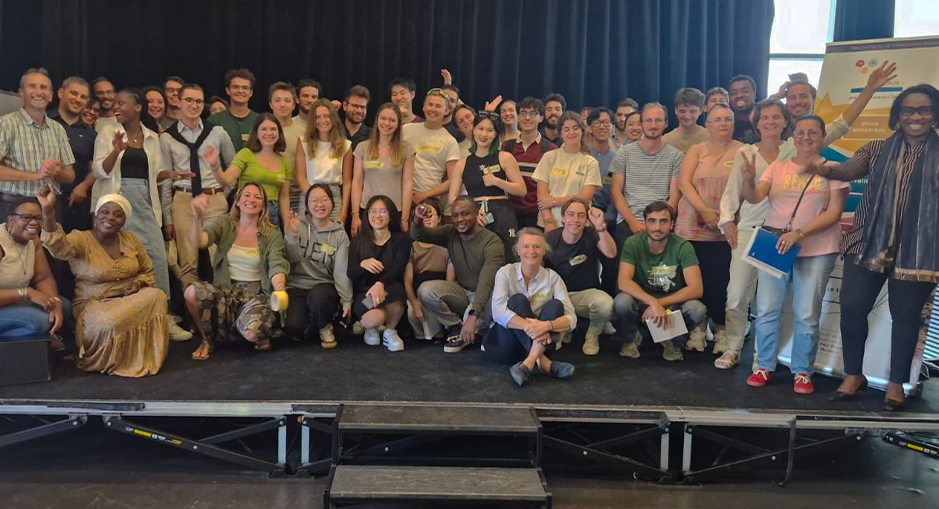
Despite a population of over 30,000 originating from 100-plus nations, Les Mureaux has long grappled with economic difficulties and social tensions, a reality shared by many similar-sized towns across France. However, where others may see limitations, the PTCE Les Mureaux (Pôle Territorial de Coopération Économique) sees opportunities. Since its inception in 2017, this citizen-led association has pursued an ambitious agenda: transforming the town through projects that foster community pride, social cohesion, and economic resilience. Over the years, they have implemented over 200 projects - from job creation in industrial settings to an “urban shepherd” program and educational initiatives - that connect people both to their environment and to each other. The workshop in late August, involving 33 HEC students from the CEMS Master Degree marked a continuation of PTCE’s efforts to engage fresh perspectives in reshaping the social and economic landscape of Les Mureaux.
Jean-Marc Semoulin, president of PTCE Les Mureaux, and Anne-Denise Daho, its director, have helped this town 40 kilometers west of Paris, become a “territory of social innovation.” Working closely with the town’s different nationalities, they’ve launched initiatives connecting people and their skills with community needs. This community-driven ethos is woven into every project, ensuring that residents play a direct role in transforming their neighborhoods. Daho highlighted how projects like the social enterprise COP'O or, more recently, the urban shepherd program and permaculture gardens help address both social and environmental issues. “Our aim is not to create a new institution but to mobilize existing resources,” she said. “Les Mureaux has the assets it needs, and our role is to bring those resources together and support local talents in making a difference.”
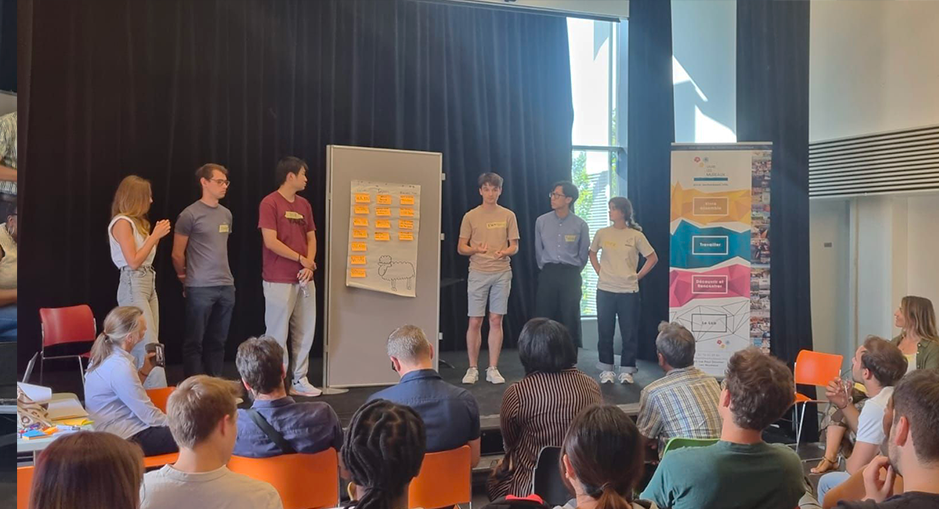
Bringing Together Issues for Sustainability
For three years now, Bénédicte Faivre-Tavignot has been inspiring HEC students through the Mureaux program which confronts the theories they’ve learnt in the school’s Master courses with on-the-ground realities around sustainability and social impact. The S&O Executive Director has been at the heart of an audacious partnership with a commune often confronted by youth unrest and social ostracization. “Les Mureaux concentrates the challenges faced by sustainability,” she explained. “The PTCE addresses environmental challenges through localized economic models, the building of low-carbon buildings, etc. It also explores ways to improve social challenges by including all the population in the economy through education, training programs and developing entrepreneurial project.”
At the heart of the HEC course is a holistic approach called systems thinking. This centuries-old approach to complex issues explores systems as a product of its parts and not a sum of its parts. "Systems thinking allows us to see the broader implications of our actions," Judit Osika explained after the daylong program in Les Mureaux. "It’s not just about solving one issue but understanding how a change in one area might impact others.”
Osika is a facilitator of social technologies and a learning experience designer. She has been partnering with organizations which aim to bring together today's leaders and those of tomorrow (students), often around the use of system thinking. Osika believes that by joining forces these partners will create a more sustainable future by solving a wide range of challenges. Invited by HEC to guide the project in Les Mureaux, she outlined solutions available to increase interconnectedness between local issues. This methodology was introduced to students through pre-work activities, including an article on circular economy from the Ellen MacArthur Foundation and an insightful video on "Operation Cat Drop." The latter describes a 1950s operation which ended by the World Health Organization air-dropping cats into Borneo to control rat populations. This singular operation reflects how disaster can befall if non-system thinking is used to solve a crisis.
Primed for Les Mureaux
The students also practiced “Connection Circles,” a tool used to map the complexity of relationships within a community. As one student noted afterwards, such exercises “helped (them) appreciate the unpredictable nature of social change, showing that even well-intentioned actions can create unintended consequences.” By the time they arrived in Les Mureaux, the students were primed to apply these insights to real-world problems, examining how the town’s projects could evolve through a broader, more interconnected lens.
They were welcomed by a PTCE association which emphasizes a strong blend of pragmatism and community engagement. Over six years, they’ve engaged approximately 10% of the town’s population. Their goal for 2025 is to reach 90% a - significant leap that demonstrates their commitment to fostering a deeper sense of community ownership and pride.
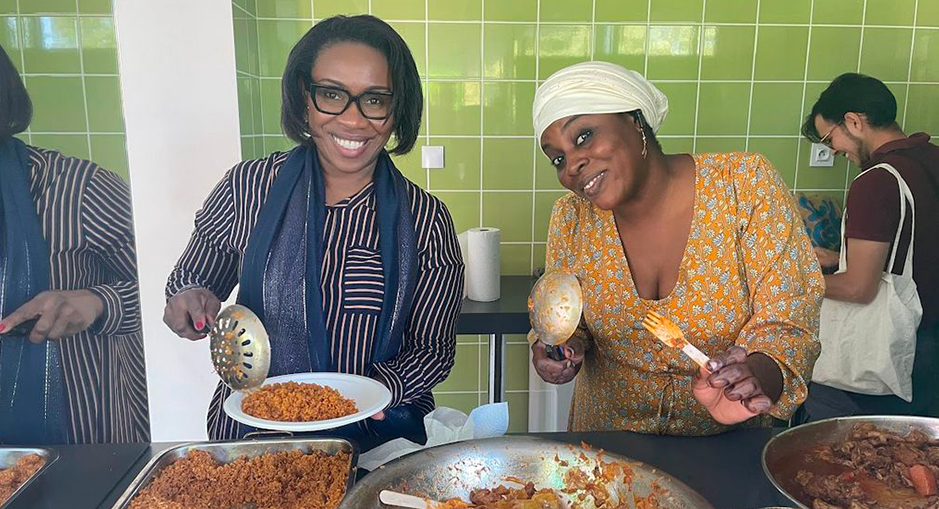
This year, they examined tangible issues that were emblematic of the town's ongoing social and economic challenges (the local authorities’ annual report characterized the town’s situation as “particularly degraded and uncertain”). The students examined how the PTCE’s “urban shepherd” project, originally designed to create community bonds, could also serve as a vehicle to provide educational and therapeutic benefits. By introducing workshops and youth-centered events around the urban shepherds, the students proposed transforming the project into an educational hub, offering programs that foster vocational skills and resilience.
Another significant challenge was environmental and economic sustainability within the community. Les Mureaux’ permaculture garden initiative, initially launched to promote ecological awareness, was seen by students as having potential for economic expansion. They suggested integrating training sessions on sustainable agriculture and creating partnerships with local schools and businesses, potentially evolving the project into a local producer's network. This would allow the garden to not only support ecological education but also provide economic opportunities through small-scale urban agriculture that could benefit local restaurants, school cafeterias, and residents.
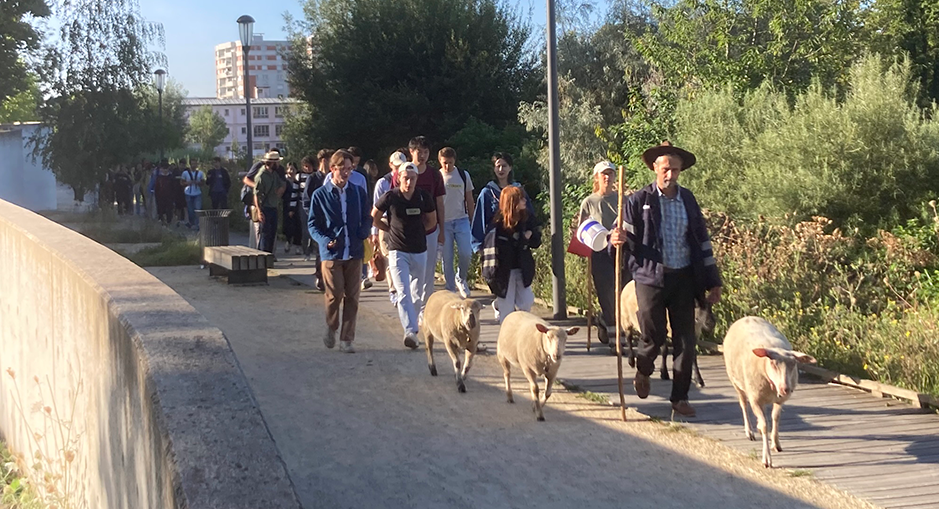
Positive Student Feedback
The day at Les Mureaux thus allowed students to step outside the academic setting and see firsthand the complexities of social impact work. Guided by Osika’s systems thinking approach, the students tried to reimagine each initiative’s broader social, educational, and economic impact. Their feedback on the day was overwhelmingly positive, with many expressing newfound respect for the PTCE’s work. One participant commented: “The organization was great. I especially enjoyed talking directly with stakeholders and getting to understand the on-the-ground challenges of social business.” Another reflected: “I was skeptical initially because social initiatives often seem superficial. But witnessing the impact of the projects, especially the kids’ reactions to the sheep, shifted my perspective entirely.”
While students appreciated the structured experience, some suggested improvements for future events. One noted a desire for more interaction with the beneficiaries themselves: “It would be fantastic to speak more with local residents impacted by these initiatives. Hearing their perspectives would add valuable context to our brainstorming.” “We mostly spoke with stakeholders representing institutional perspectives,” added another. “It would be enlightening to listen to residents facing these issues daily. Understanding their concerns could help us create even more relevant solutions.”
One participant, who had personal experience with the foster care system, noted that some speakers attributed social issues to individual failings rather than systemic factors. “I found it troubling that root causes like institutional discrimination and lack of access were overlooked,” he wrote. “It reinforced the need to approach these projects with empathy and a well-rounded understanding.”
Community Dynamics
The importance of such feedback was not under-estimated by Judit Osika: “It’s crucial to acknowledge different perspectives—whether they’re from local leaders or from those directly affected. That’s how we build a sustainable, inclusive approach.” Throughout the day, she encouraged structured dialogue and collective brainstorming: “It’s always more than just coming up with ideas. We’re here to understand what’s feasible, what the community needs, and how we can build on existing resources.”
According to the veteran consultant, this exposure helps cultivate skills that will serve them in their future careers. "Working on the ground with local stakeholders builds a different kind of empathy and problem-solving capability," she remarked.
Scaling Social Impact: Future Plans for PTCE Les Mureaux
PTCE Les Mureaux aims to expand its reach, not only within the town but also as a model for other communities. Already, neighboring towns have expressed interest in adopting elements of their projects, particularly the “urban shepherd” and community garden initiatives. Osika, Semoulin, and Daho hope that by continuing to engage external stakeholders, including academic institutions like HEC Paris, they can build a more resilient, interconnected community across regional borders.
The challenge now is the financing for such ambitious plans. As a non-profit organization, the PTCE’s leaders rely on donations, government support, and partnerships with local businesses. On this occasion, the input from HEC students was particularly valuable in identifying alternative revenue streams, such as crowdfunding and corporate sponsorships for community events. But Osika recognized that such complex questions needed more time than a few days: “Business models were brought up, general lines for corporate support were suggested, but all the stakeholders need to come together over a long period of time to hammer out concrete measures.”
A Nationwide Model for Sustainable Community Development?
The PTCE Les Mureaux initiative exemplifies how a citizen-led organization can foster long-term change by focusing on inclusion and innovation. By bringing together residents, academic partners like HEC Paris, and local businesses, PTCE is beginning to create a robust support network that addresses the town’s unique challenges and aspirations. For HEC students, the experience at Les Mureaux offers invaluable lessons in community engagement and sustainable development. “They’ve helped the community leaders and their will to create social cohesion that makes this town more resilient and unified should any crisis crop up,” said Bénédicte Faivre-Tavignot.
As Judit Osika reflected on the day’s events, she emphasized the importance of continuing to foster collaborations like these: “We’re all part of larger systems, and the more we recognize that, the better we’ll be able to create lasting change,” she said. She hopes that, through its pioneering work, PTCE Les Mureaux will not only transform its community but also set a precedent for inclusive social innovation that could inspire towns and cities across France."
